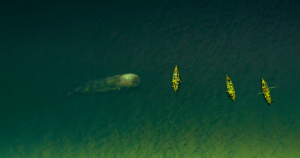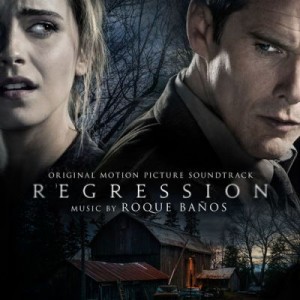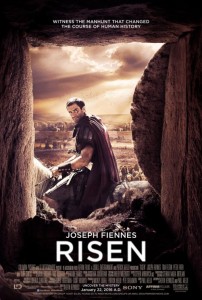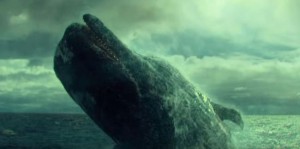If you madly hunt for great composing talents the world over, chances are you’ll hear the particular, vast melodic abilities of one Roque Baños. Hailing from Spain where he’d notably engage in the Spaghetti Western pastiche of 800 BULLETS, the artistic classicism of GOYA IN BOURDEAUX and the bad cop antics of TORRENTE among the numerous movie he’d score in his home country, Baños first caught American ears with his romantically twisted crime stylings for 2000’s SEXY BEAST and the Herrmann-esque doom of 2004’s Theremin-possessed THE MACHINIST. It’s been a long, prolific journey to our shores over the years before Banos truly made Hollywood landfall in 2013 with the vengeful music for the reboots of EVIL DEAD and OLDBOY. However, the impactful music of these two genre films still didn’t immediately signaled to studios that Baños could swim in their elevated, Oscar-worthy waters, even Banos’ richly thematic scores overseas like ALATRISTE did. But leave it the vagaries of film financing to finally give Baños the harpoon shot he’s long deserved, hitting his potential golden statue dead–on to play the real story of the clash between vengeful man and sea beast for director Ron Howard’s powerful IN THE HEART OF THE SEA.
Mythologized into MOBY DICK by author Herman Melville, whom we see dragging the truth out of a guilt-wracked, and now grown survivor of the whaling ship The Essex, IN THE HEART OF THE SEA pits the low born seaman Owen Chase (Chris Helmsworth) against the ship’s arrogant captain George Polland (Benjamin Walker), with both determined to make their fortunes in the horrific act of slaughtering nature’s most magnificent animals. But when its champion finally wreaks payback of his own, the ship’s survivors find that turnabout is ironic play as they go through hell on earth to survive in the vast ocean waters. With some of his most memorable themes at the ready, Baños captures seafaring excitement turned to moral shock and then a Zen sense of suffering. Tribal percussion is the excitement of great white hunters before meeting the boat-smashing drums of a great white whale, the peaceful, clicking communication of his own tribe turned to all-out warfare. Sweeping melodies as massive as any befitting an all hands on deck costume drama, capture American hubris on the edge of the industrial revolution, while the peace of souls deep under the ocean is embodied in a beautifully haunting whale chant. It’s a multi-layered musical HEART that’s deep indeed in both the film’s impressive visual surface and troubled psychology that ultimately delivers a profound sense of realization truly worthy of the tale that turned into MOBY DICK.
ASSIGNMENT X: IN THE HEART OF THE SEA is a very big step up for you when it comes to scoring major Hollywood movies. How did you get this opportunity, and was the literal size and responsibility of the task something that weighed on you?
Baños: I got this job because the film was a European co-production, and the whole post-production needed to be done in London, where the composer would be for five months. So they needed to hire a European composer. Ron was looking at any number of candidates, but he got the suggestion of using me from two important people to him. One was Guillermo del Toro, and the other one was Hans Zimmer, who told Ron that I’d make beautiful themes, which is what he needed for this movie. Then I had a meeting with Ron, where I shared with him my period scores from movies like ALATRISTE. He loved the scores and I got on board. I had the opportunity to demonstrate that I could do a big studio movie, of which this was the first one at that level. So I got on my guns with everything I’d learned over the years of doing film music, and put them all together for the largest production I’d ever done in my life.
AX: Did getting the job make you turn back to explore MOBY DICK and the fate of the Essex. How did reading about the story influence your approach?
Baños: Yes, of course. After I got the call, the first thing I did was to purchase the book about this incredible odyssey. I’d also read MOBY DICK when I was a kid. But now I needed to learn about The Essex. When I read it, I was really impressed, and I realized that it was more about the tragedy of these people than the whale. I knew from earlier conversations with Ron that he wanted the viewpoint to be from that point of tragedy, while also show how nature reacts to people attacking it. That was his first approach for my score.
AX: Did the approach to such seafaring period movies as MUTINY ON THE BOUNTY also influence what you and Ron wanted the score to achieve?
Baños: Ron told me that this score needed to be really different from any kind of “sea” movie that had come before it. We were working on themes that captured the idea of people thirsting for money, because the biggest treasure they had at that time was whale oil, which they’d do anything to get from nature. The Quakers on Nantucket Island they thought they were put on earth by God to take advantage of anything that nature could give to them. Our hero was supposed to be the captainship, which he doesn’t, and that pisses him off. So his goal is to bring back a ship full of oil so he’d become a captain. It was all a matter of money and power like that. So this wasn’t a period adventure. It was about people fighting for profit against nature, which is represented by the whales. And nature is going to punish these whalers.
AX: What did you take away from Ron’s approach to how he likes music to work in his films?
Baños: He has such a great viewpoint about the music that I never disagreed with him once about the sore. Ron is a very sensitive director and wants the score to be one of the most important things in his movie. In fact, he told me that the music would be more than 50% of the film’s effectiveness. With every minute, he was prodding me to do my best.
AX: As a composer who’s most often melodic what did you realize about the importance of giving IN THE HEART OF THE SEA distinctive themes. And could you talk about developing them?
Baños: If you have good themes that clearly represent the emotions that you want the audience to feel, then you have more than 80% of the score. It was always important for us to have a clear separation between what the aims of the whalers are, and what the feeling was from the side of nature. I had a “whalemen” theme that could be heard when they go out to hunt, which is composed with the pentatonic scale, which is used in ethnic music. It keeps a sense of excitement, as if these men were hunting lions in the jungle. We have another theme for nature that we called the “whale” theme. It’s more melodic, peaceful and mysterious. The first music we hear in the movie is notes from that theme, which soon turns horrifying for the whalers. By the time I got the first cut of the film, I’d developed my themes to the point where I could easily lay my demos into the film for Ron to hear.
AX: How did you want the score to embody the whales’ clicking language and sonar calls?
Baños: Many people thing I used a lot of electronic sounds. But I actually recorded everything from the animals themselves, and then processed them in a way that let me create “notes” from their language. It all comes from the organic source of nature.
AX: How did you want your haunting use of human voice to serve the score, especially with the beautiful white whale chant?
Baños: We chose to only use that song at the end of the movie. The voice basically represents hope and peace. I put it at the end of the movie in what we could call a song, because I want the audience that stays seated through the credits to feel some basic hope for human being and the peace we all need. It’s music that makes you feel peaceful, and Ron really liked that idea, especially as it represents Owen Chase as he goes from being angry at the whale to making peace with nature,
AX: Whaling is now something that’s rightfully regarded as horrific. In the first whaling scene, was it difficult to convey the “thrill” of the hunt while also playing the awful tragedy to it?
Baños: The music that you hear when the whalers are in their boats is very ancestral, like something epic is going to happen. It puts us on the side of the whalers. They’re putting their lives in danger, and they look like heroes. Everyone is excited. But as soon as they harpoon one of the whales, the music changes sides, and gets more tragic. When you see how the whale pulls at the harpoon line, the music gets really dramatic. It makes us feel for this poor animal that’s trying to escape. Then when it rises to the surface and dies, the only thing we’re feeling is sorry for the whale. The excitement that we felt at first has turned to the horror of what these whalers are doing to them.
AX: Could you talk about your approach to the white whale attack, and how you wanted to embody the real Moby Dick?
Baños: I wanted to hear it as the force of nature, something that is uncontrollable and could crush you in a second. So I used an Australian aboriginal wind instrument called the didgeridoo, which gives the sound of something very old, very big and unknown.
AX: The use of winds and percussion in HEART is almost tribal in its effect like that. Were you going for something primal in your choice of ethnic instruments?
Baños: When I was starting to compose, I was using regular percussion from the orchestra in the action scenes. But we kept talking about getting something unique and primal. So then I thought of using the elements that they had on the ship to create a library of sounds that we could use as the percussion section. I ended up with two recording days on a ship where we’d record the sails being hit, and the ropes and harpoons hitting the deck, as well as the harpoons hitting the deck. I also had sounds from wet clothes hitting the harpoons’ sharpening stones So the percussion is the ship itself.
AX: Was it important for you to retain some sense of hope when the Essex survivors are adrift so as to avoid making the movie too slow, or depressing when capturing their ordeal?
Baños: We were aware of the third act being much slower than the first two. If you pay attention to the music we ended up with, it doesn’t have any sorrow. It’s more spiritual and gives a sense that nature’s elements are punishing these people. The sun hitting them is represented by samples, as well as the waving of the sea, which is a low drone – as if it’s coming from the heart of the earth. That puts the audience in a state where they’re thinking about what it’s like to be in those little boats for three months, as opposed to thinking about how boring it is for the men. I believe that the music really helps make the movie faster in that way.
AX: In a far less body draining way, do you think being a composer is as much of an isolating, sink-or-swim experience as what these men go through?
Baños: I was very lucky that I was in the Spanish navy for seven years when I was younger, being in the military band as a saxophone player. I did a trip on a sail ship from the Spanish navy, touring the Atlantic Ocean for seven months. So even though I have to be in my studio now, with nobody there but me thinking about how I’m going to compose this music, I had a lot of memories come into my mind from that time. In a way, that helped me a lot on IN THE HEART OF THE SEA. I was watching the movie seeing these characters struggling to survive, and I felt like I was in the boat with them. So it’s good to be alone, because it really lets you get into the story, to understand how these characters feel, even though my experience was much better than theirs!
AX: What was the experience like of being on the scoring stage in England and getting the full force unleashed of the music you’d written? Was there anything memorable in Ron’s reaction to it?
Baños: It was very emotional when we recorded the music at Abby Road. I’d scored movies there before, but never before with an orchestra of 100 players. Everyone was in the room, from Ron Howard to Warner Brother’s head of music Paul Broucek. One of the first cues we recorded was the sequence where they abandon The Essex, which a big, emotional cue. Everyone was getting the emotion, and realizing the dimension that a huge orchestral score gives to a big picture like this. I had another example of this when I worked on EVIL DEAD, and the director Fede Alvarez told me that he didn’t realize that he was doing a big Hollywood movie until he listened to the music.
AX: Next year we’ll hear your score Kevin Reynolds’ RISEN, which is a spin on the quest to “solve” the reappearance of Christ, a la THE ROBE. Could you talk about your approach, and how it reflects how “bible scoring” has changed, and gotten a bit more realistic, if no less epic since the days of Alfred Newman?
Baños: At first we weren’t going to have those kind of “big” themes. But as we worked on RISEN, Kevin and I realized that the last part of the movie needed to have these “bible” themes in the style of Alfred Newman. But at the same time I used a lot of atmospheric sounds as well in the score. The Romans thought that the people from that area were savages because they only had one God, while they lived in luxury with many gods. So as the Roman tribune is investigating what happened to Jesus body, everything gets very mysterious for him, and once again, ancestral. Kevin wanted to show that something bigger, and not from this world, was happening around him. I also used sounds that we could hear at the time, like the wind shifting the desert sand. There’s also the sound of water, as the end of the film takes place in the Galilean Sea. But above all, we needed to have themes that would be close to that “old fashioned” sound.
AX: You’ve also scored the psychological thriller REGRESSION for director Alejandro Amenabar. What’s it like working with a director who’s also a composer with his last thriller THE OTHERS?
Baños: I first met Alejandro fifteen years ago. He’d always loved my work, and wanted to do something with me. Finally all of these years later we have. At first he was going to do the REGRESSION score himself, and then someone suggested he hire me. From our very first meeting on it, Alejandro was as totally respectful. He sat behind me listening to my proposals, giving me general notes. Our collaboration has been very nice and calm, and I’m happy to have worked with him, especially because of his wise attitude towards the music.
AX: How do you hope that IN THE HEART OF THE SEA will elevate you when it comes to getting major Hollywood films? And what do you want those people to hear your ability when it comes to this score?
Baños: When I do any score, I never think about how it’s going to affect my career. I just think about how to do the most appropriate score possible. I’m lucky to have done IN THE HEART OF THE SEA. Not because it could elevate me, but because it gave me the honor of working with one of the greatest directors in the film industry, and world today. Ron Howard is one of my favorites, because I’ve been a fan of his for many years. So I will be very satisfied if people tell me that they had the same feelings that we had while working on the film. When someone calls me, or I read a nice comment saying that the music is good, that for me is the big prize. Of course I want to keep working, which is my goal, whether it’s here or in Spain. To keep doing scores for good movies and good stories. That’s my only concern.
Roque Baños’ score for IN THE HEART OF THE SEA is available on WaterTower Music HERE. Then listen Roque’s “Regression” on Lakeshore Records HERE
Visit Roque Banos’ website HERE
Follow us on Twitter at ASSIGNMENT X
Like us on Facebook at ASSIGNMENT X
Article Source: Assignment X
Article: Interview with IN THE HEART OF THE SEA composer Roque Baños
Related Posts:
















